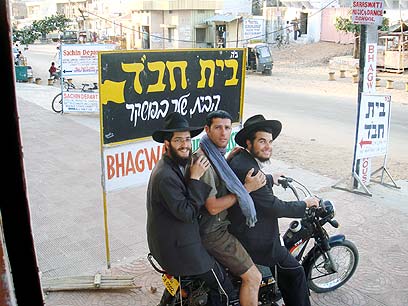
Traveling the world with a yarmulke
Many religious Jews encounter difficulties in combining their Jewish observant routine overseas while enjoying many unique possibilities of destinations worldwide. More means are now available to provide travelers with comfortable solutions
For many tourists of the religious sector, traveling abroad with its food limitations and Shabbat restrictions has led them to limit their overseas visits to several days alone being denied the full travel experience. In the past, organized travel options for the religious sector were far fewer than those offered to secular tourists due to the complex logistics entailed in meeting the needs of observant tourists.
Not all religious tourists are the same, of course. Most of the participants of organized tours for the religious public are traditionalists and national-religious. Currently there are several travel agencies offering organized tours for religious and traditional tourists which enable travelers to enjoy what the world has to offer while maintaining their religious lifestyle routine.
Blowing the horn in New York (Photo: AP)
Observing Shabbat overseas
Such tours require thorough planning and special attention. Several aspects must be addressed: Firstly, a seasoned guide who is thoroughly familiar with the destination area and both sensitive to the religious tourist's needs. Secondly, maintaining a Jewish atmosphere. When practicing Jews travel overseas they like to enjoy a sense of Jewish culture, and therefore the guide must incorporate some Jewish content into explanations of the various sites.
Thirdly, Shabbat must be observed. Prayers, Shabbat meals and sermons should be held in order to provide the travelers with a Jewish experience abroad. It is also important to include some Jewish-related sites in the tours such as Jewish cemeteries, Chabad Centers and other Jewish monuments. On Shabbat, the tour must be within walking distance of the hotel.

Chabad Center in India (Photo: Ravit Gonen)
Finally, the most important aspect of religious tours aboard is the food. As kosher food isn't readily available in many destinations, travel agencies either provide packaged food from Israel or secure reservations in kosher restaurants ahead of time. This, at times requires complex logistical coordination in making sure the bread is kosher, the wine is Israeli and the food is served on disposable dishes.
It may seem trivial for many tourists, but food is actually a major issue for religious travelers. Many religious people find it bothering to see un-kosher food served at the breakfast buffet for example, even if they are not the ones eating it themselves. In this case, agencies can check in advance whether there is an option for a private buffet for their group, which would obviously entail a special payment.
Another issue pertains to daily prayers. Synagogues are usually not available nearby, not to mention Torah scrolls for Shabbat, Monday and Thursday prayers. Organized tours for the religious public usually hold a special Shabbat routine in which the day is devoted to prayer and rest. Walking tours will usually be held near the hotel area. Shabbat meals are a chance to the group to socialize and discuss the portion of the week.
Special attractions. Jewish cemetery in Prague (Photo: Shalom Bar Tal)
New destinations
In the past, close destinations such as Classical Europe or the Mediterranean Basin were the most popular for the observant travelers. Options have since considerably grown allowing religious tourists to enjoy other parts of the world, from Spain, Morocco and Sweden to Australia and New Zealand. One destination seems to have emerged as particularly attractive for the religious public – the United States, home to many Jewish communities. The US is particularly attractive for Israelis now since the dollar's devaluation. Touring the "land of opportunities" offers a variety of attractions - a coast to coast trip, New York and the East Coast area or California and the sunny West Coast.
In terms of sightseeing, tours for the religious public are no different from those of secular tourists. Nevertheless, areas with famous synagogues or ancient cemeteries will not be skipped. One example is the Jewish cemetery in Prague containing the grave of the Judah Loew ben Bezalel.
And what about the cost? Naturally, organized tours tailored for the religious public's needs are more expensive than regular tours. The extra money goes to kosher food, Shabbat meals and the many other little details.
- Follow Ynetnews on Facebook












